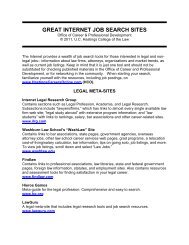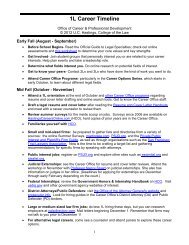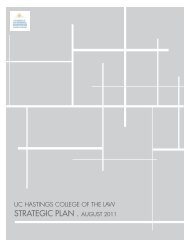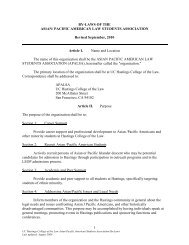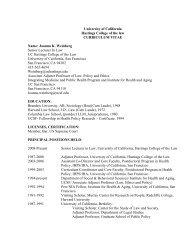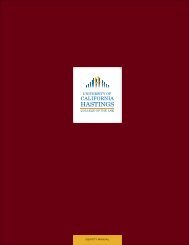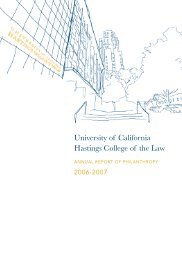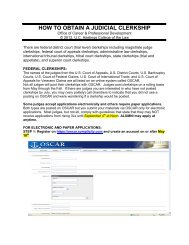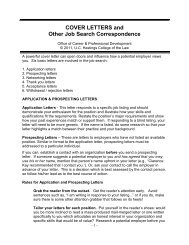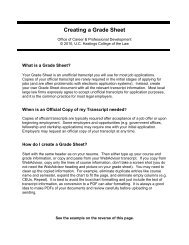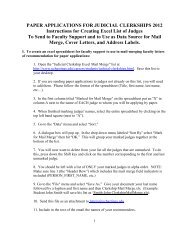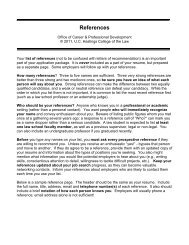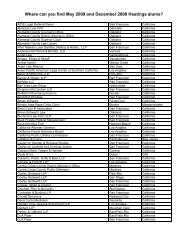IBT Exam - Hastings College of the Law
IBT Exam - Hastings College of the Law
IBT Exam - Hastings College of the Law
You also want an ePaper? Increase the reach of your titles
YUMPU automatically turns print PDFs into web optimized ePapers that Google loves.
<strong>Exam</strong> #<br />
Return <strong>Exam</strong> and Answer<br />
to Student X<br />
UNIVERSITY OF CALIFORNIA<br />
HASTINGS COLLEGE OF THE LAW<br />
FINAL EXAMINATION<br />
INTERNATIONAL BUSINESS TRANSACTIONS<br />
(COURSE # 41611)<br />
PROFESSOR WILLIAM S. DODGE<br />
* * * * *<br />
FALL SEMESTER 2005<br />
THURSDAY, DECEMBER 8, 2005<br />
TIME: TWO AND ONE-HALF (2-2) HOURS<br />
* * * * *<br />
OPEN BOOK EXAMINATION<br />
(Instructions on Next Page)<br />
Page 1 <strong>of</strong> 8 Pages
Final <strong>Exam</strong>ination <strong>Exam</strong> #<br />
International Business Transactions Return <strong>Exam</strong> and Answer<br />
Pr<strong>of</strong>essor Dodge to Student X<br />
INSTRUCTIONS<br />
1. This is an open book examination. You may consult <strong>the</strong> course<br />
book, supplemental materials, your notes, and any o<strong>the</strong>r<br />
materials you wish. You should bring with you <strong>the</strong> course<br />
book and supplemental materials because one or more <strong>of</strong> <strong>the</strong><br />
questions may require you to refer to <strong>the</strong>m.<br />
2. The allotted time for <strong>the</strong> examination is two and a half<br />
hours. There are four questions. Question one is worth 60<br />
points; question two is worth 30 points; question three is<br />
worth 30 points; and question four is worth 30 points. I<br />
recommend that you spend one hour on question one and 30<br />
minutes on each <strong>of</strong> <strong>the</strong> o<strong>the</strong>r questions.<br />
3. Read each question carefully, including <strong>the</strong> instructions<br />
contained in <strong>the</strong> question. Within <strong>the</strong> limits <strong>of</strong> those<br />
instructions, please discuss each issue reasonably raised by<br />
<strong>the</strong> facts, including issues that might be rendered moot by<br />
your resolution <strong>of</strong> ano<strong>the</strong>r issue.<br />
4. Think about and organize your answers before starting to<br />
write.<br />
5. Please write as neatly as you can.<br />
Good luck!<br />
(<strong>Exam</strong>ination Begins on Next Page)<br />
Page 2 <strong>of</strong> 8 Pages
Final <strong>Exam</strong>ination <strong>Exam</strong> #<br />
International Business Transactions Return <strong>Exam</strong> and Answer<br />
Pr<strong>of</strong>essor Dodge to Student X<br />
QUESTION ONE<br />
(60 points)<br />
My-Pod, Inc., is a Delaware corporation with its principal<br />
place <strong>of</strong> business in Cupertino, California. My-Pod makes personal<br />
music players that can hold up to 10,000 songs, which it<br />
currently markets in <strong>the</strong> United States and <strong>the</strong> European Union.<br />
My-Pod holds product and process patents for <strong>the</strong> player in <strong>the</strong><br />
United States, as well as U.S. trademark rights for <strong>the</strong> name “My-<br />
Pod.” It holds similar rights in <strong>the</strong> European Union.<br />
My-Pod is interested in penetrating <strong>the</strong> Latin American<br />
market for personal music players, and has entered negotiations<br />
for a licensing agreement with Mi-Musica, S.A., a Guatadoran<br />
corporation with its principal place <strong>of</strong> business in Estancia,<br />
Guatador. Guatador is a member <strong>of</strong> <strong>the</strong> Andean Community, and My-<br />
Pod is hoping that Mi-Musica will be able to market <strong>the</strong> My-Pod<br />
players it manufactures not only in Guatador and o<strong>the</strong>r Andean<br />
Community countries, but throughout Latin America. However, My-<br />
Pod is also concerned that parallel imports <strong>of</strong> Guatadoran-made<br />
players might undercut its sales in <strong>the</strong> United States and <strong>the</strong><br />
European Union.<br />
My-Pod’s general counsel, Peggy Poddle, has given you <strong>the</strong><br />
following draft licensing agreement. She has asked you to suggest<br />
changes and additions to ensure compliance with Andean Community<br />
law and to protect My-Pod’s interests. She has also asked you<br />
whe<strong>the</strong>r My-Pod would be able to prevent parallel imports <strong>of</strong><br />
Guatadoran-made players into <strong>the</strong> United States and <strong>the</strong> European<br />
Union.<br />
Please advise Ms. Poddle.<br />
LICENSE AGREEMENT<br />
This agreement is made this __ day <strong>of</strong> ____, 2005<br />
by and between My-Pod, Inc., a Delaware corporation<br />
having its principal place <strong>of</strong> business at Cupertino,<br />
California (hereinafter ALicensor@), and Mi-Musica,<br />
S.A., a Guatadoran corporation having its principal<br />
place <strong>of</strong> business at Estancia, Guatador (hereinafter<br />
ALicensee@).<br />
(Question One Continues on Next Page)<br />
Page 3 <strong>of</strong> 8 Pages
Final <strong>Exam</strong>ination <strong>Exam</strong> #<br />
International Business Transactions Return <strong>Exam</strong> and Answer<br />
Pr<strong>of</strong>essor Dodge to Student X<br />
Whereas Licensor has invented a method<br />
(hereinafter A<strong>the</strong> Process@) for <strong>the</strong> manufacture <strong>of</strong><br />
personal music players (hereinafter A<strong>the</strong> Product@) and<br />
possesses valuable secret knowledge useful in<br />
performing <strong>the</strong> Process (hereinafter A<strong>the</strong> Know-how@);<br />
Whereas Licensor has obtained patents for both <strong>the</strong><br />
Process and <strong>the</strong> Product in <strong>the</strong> United States and in<br />
Guatador (hereinafter A<strong>the</strong> Patents@);<br />
Whereas Licensor has obtained trademarks for <strong>the</strong><br />
My-Pod name in <strong>the</strong> United States and in Guatador<br />
(hereinafter A<strong>the</strong> Trademark@);<br />
Now <strong>the</strong>refore in consideration <strong>of</strong> <strong>the</strong> mutual<br />
promises contained herein, Licensor and Licensee hereby<br />
agree as follows:<br />
1. Grant. Licensor grants Licensee a license, exclusive<br />
<strong>of</strong> Licensor and o<strong>the</strong>r licensees, to practice <strong>the</strong><br />
Patents and Know-how in Guatador and to sell <strong>the</strong><br />
Product under <strong>the</strong> Trademark in North and South America,<br />
with <strong>the</strong> exception <strong>of</strong> <strong>the</strong> United States and Canada<br />
(hereinafter “<strong>the</strong> Territory”). Licensee shall not sell<br />
<strong>the</strong> Product outside <strong>the</strong> Territory.<br />
2. Improvements. During <strong>the</strong> term <strong>of</strong> this Agreement,<br />
Licensor shall make available to Licensee any<br />
improvement related to <strong>the</strong> Process or Product, which<br />
Licensor has acquired, at no cost to Licensee.<br />
Licensee shall assign to Licensor <strong>the</strong> entire right to<br />
any improvement related to <strong>the</strong> Process or Product,<br />
which Licensee has developed, at no cost to Licensor.<br />
3. Trademark. Licensee shall ensure that <strong>the</strong> Trademark<br />
is affixed to <strong>the</strong> Products it manufactures and sells<br />
under this Agreement.<br />
4. Royalty. Licensee shall pay Licensor a royalty <strong>of</strong><br />
33% <strong>of</strong> Licensee=s net pr<strong>of</strong>its from sales <strong>of</strong> <strong>the</strong><br />
Products in <strong>the</strong> Territory. Irrespective <strong>of</strong> <strong>the</strong> sales<br />
achieved in any given year, Licensee shall pay Licensor<br />
U.S.$25,000 upon each anniversary <strong>of</strong> <strong>the</strong> date <strong>of</strong> this<br />
Agreement.<br />
(Question One Continues on Next Page)<br />
Page 4 <strong>of</strong> 8 Pages
Final <strong>Exam</strong>ination <strong>Exam</strong> #<br />
International Business Transactions Return <strong>Exam</strong> and Answer<br />
Pr<strong>of</strong>essor Dodge to Student X<br />
5. Term and Termination. This agreement shall continue<br />
until <strong>the</strong> expiration <strong>of</strong> Licensor=s Patents in Guatador,<br />
provided, however, that ei<strong>the</strong>r party may terminate this<br />
agreement upon 10 days= written notice in <strong>the</strong> event<br />
that <strong>the</strong> o<strong>the</strong>r party breaches any term <strong>of</strong> this<br />
agreement and fails to cure such breach within 30 days<br />
<strong>of</strong> receipt <strong>of</strong> written notice <strong>of</strong> such breach.<br />
6. Arbitration. All disputes arising out <strong>of</strong> this<br />
agreement shall be finally decided by arbitration<br />
conducted in San Francisco, California pursuant to <strong>the</strong><br />
International Arbitration Rules <strong>of</strong> <strong>the</strong> American<br />
Arbitration Association.<br />
7. Entire Agreement. This agreement constitutes <strong>the</strong><br />
entire agreement <strong>of</strong> <strong>the</strong> parties.<br />
(End Question One - Question Two on Next Page)<br />
Page 5 <strong>of</strong> 8 Pages
Final <strong>Exam</strong>ination <strong>Exam</strong> #<br />
International Business Transactions Return <strong>Exam</strong> and Answer<br />
Pr<strong>of</strong>essor Dodge to Student X<br />
QUESTION TWO<br />
(30 points)<br />
Your client, a U.S. manufacturer, wishes to enter an<br />
agreement with an agent to sell its product in Germany, but would<br />
like to avoid <strong>the</strong> effect <strong>of</strong> those provisions <strong>of</strong> German law<br />
implementing Article 17 <strong>of</strong> <strong>the</strong> EU Council Directive on Commercial<br />
Agents. Please discuss and evaluate <strong>the</strong> options for your client?<br />
(End Question Two - Question Three on Next Page)<br />
Page 6 <strong>of</strong> 8 Pages
Final <strong>Exam</strong>ination <strong>Exam</strong> #<br />
International Business Transactions Return <strong>Exam</strong> and Answer<br />
Pr<strong>of</strong>essor Dodge to Student X<br />
QUESTION THREE<br />
(30 points)<br />
In 2001, <strong>the</strong> United States entered a Free Trade Agreement<br />
with <strong>the</strong> Republic <strong>of</strong> Oz. Although much <strong>of</strong> <strong>the</strong> agreement deals<br />
with matters <strong>of</strong> trade, Chapter 10 provides certain protections to<br />
foreign investors, including <strong>the</strong> following provision:<br />
“Article 1008. Companies <strong>of</strong> ei<strong>the</strong>r Party shall be<br />
permitted to engage, within <strong>the</strong> territories <strong>of</strong> <strong>the</strong><br />
o<strong>the</strong>r Party, accountants and o<strong>the</strong>r technical experts,<br />
executive personnel, attorneys, agents and o<strong>the</strong>r<br />
specialists <strong>of</strong> <strong>the</strong>ir choice.”<br />
Article 1001 defines “company <strong>of</strong> a Party” as “a company<br />
constituted or organized under <strong>the</strong> laws <strong>of</strong> a Party.”<br />
The Bank <strong>of</strong> Oz is a financial institution incorporated under<br />
Ozian law with branches throughout <strong>the</strong> United States, including a<br />
number in California. Recently a class action was filed against<br />
<strong>the</strong> Bank <strong>of</strong> Oz on behalf <strong>of</strong> its female non-managerial employees<br />
alleging that <strong>the</strong> Bank’s policy <strong>of</strong> hiring only male Ozian<br />
citizens to fill senior management positions in its California<br />
branches violates Title VII <strong>of</strong> <strong>the</strong> 1964 Civil Rights Act and<br />
California’s 2004 Citizenship Discrimination Act (“CDA”). Section<br />
2 <strong>of</strong> <strong>the</strong> CDA provides:<br />
“It shall be unlawful for any employer to fail or<br />
refuse to hire or to discharge any individual, or<br />
o<strong>the</strong>rwise to discriminate against any individual with<br />
respect to his compensation, terms, conditions, or<br />
privileges <strong>of</strong> employment, because <strong>of</strong> such individual's<br />
citizenship.”<br />
The Bank has moved to dismiss both <strong>the</strong> federal and state<br />
claims based on Article 1008 <strong>of</strong> <strong>the</strong> Free Trade Agreement. Please<br />
discuss whe<strong>the</strong>r <strong>the</strong> motion should be granted.<br />
(End <strong>of</strong> Question Three C Question Four on Next Page)<br />
Page 7 <strong>of</strong> 7 Pages
Final <strong>Exam</strong>ination <strong>Exam</strong> #<br />
International Business Transactions Return <strong>Exam</strong> and Answer<br />
Pr<strong>of</strong>essor Dodge to Student X<br />
QUESTION FOUR<br />
(30 points)<br />
On September 29, 2005, Senator Inh<strong>of</strong>e introduced Senate Bill<br />
1797—<strong>the</strong> Foreign Investment Security Act <strong>of</strong> 2005. The Act would<br />
amend <strong>the</strong> Exon-Florio provision <strong>of</strong> U.S. law in five ways:<br />
(1) It would extend <strong>the</strong> initial period after filing notice,<br />
during which CFIUS makes its determination whe<strong>the</strong>r to investigate<br />
a proposed transaction, from 30 to 60 days.<br />
(2) It would permit <strong>the</strong> chairman and ranking member (in o<strong>the</strong>r<br />
words, <strong>the</strong> top Republican and top Democrat acting toge<strong>the</strong>r) <strong>of</strong><br />
<strong>the</strong> relevant Senate or House committee to require that CFIUS<br />
conduct a 45-day investigation <strong>of</strong> a proposed transaction.<br />
(3) It would add a new factor to be considered under § 2170(f):<br />
“(6) <strong>the</strong> long-term projections <strong>of</strong> United States<br />
requirements for sources <strong>of</strong> energy and o<strong>the</strong>r critical<br />
resources and materials for economic security.”<br />
(4) It would require additional reporting to Congress—<br />
specifically, (1) reporting <strong>the</strong> findings and recommendations <strong>of</strong><br />
any CFIUS investigation to <strong>the</strong> relevant Senate and House<br />
committees at <strong>the</strong> same time it is reported to <strong>the</strong> President; and<br />
(2) quarterly reports summarizing and analyzing each transaction<br />
that is being reviewed, was reviewed during <strong>the</strong> past quarter, or<br />
is likely to be reviewed during <strong>the</strong> next quarter. It fur<strong>the</strong>r<br />
provides that “[e]ach such summary and analysis shall be<br />
submitted in unclassified form, with classified annexes as <strong>the</strong><br />
Secretary [<strong>of</strong> <strong>the</strong> Treasury] determines are required to protect<br />
company proprietary information and o<strong>the</strong>r sensitive information.”<br />
(5) It would allow Congress to block a transaction that <strong>the</strong><br />
President had allowed to go forward by a joint resolution passed<br />
by both houses <strong>of</strong> Congress and signed by <strong>the</strong> President. A<br />
transaction <strong>the</strong> President decided not to block could not be<br />
consummated until 10 legislative days after <strong>the</strong> President<br />
notified Congress <strong>of</strong> his decision. If a joint resolution were<br />
introduced during that time, <strong>the</strong> transaction could not be<br />
consummated for an additional 30 legislative days to give each<br />
house <strong>of</strong> Congress an opportunity to vote on <strong>the</strong> joint resolution.<br />
Please evaluate <strong>the</strong> advantages and disadvantages <strong>of</strong> each <strong>of</strong><br />
<strong>the</strong>se proposals.<br />
* * * * (End <strong>of</strong> <strong>Exam</strong>ination) * * * *<br />
Page 8 <strong>of</strong> 8 Pages



